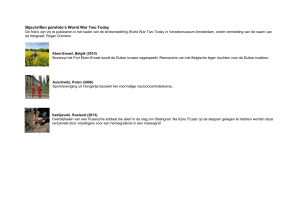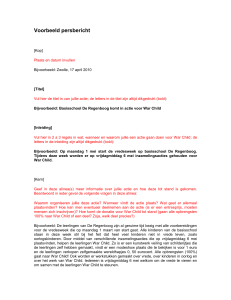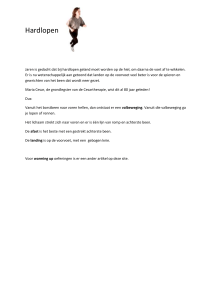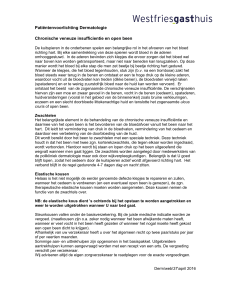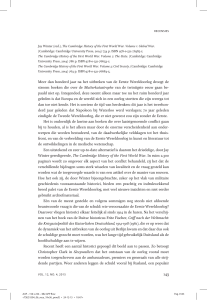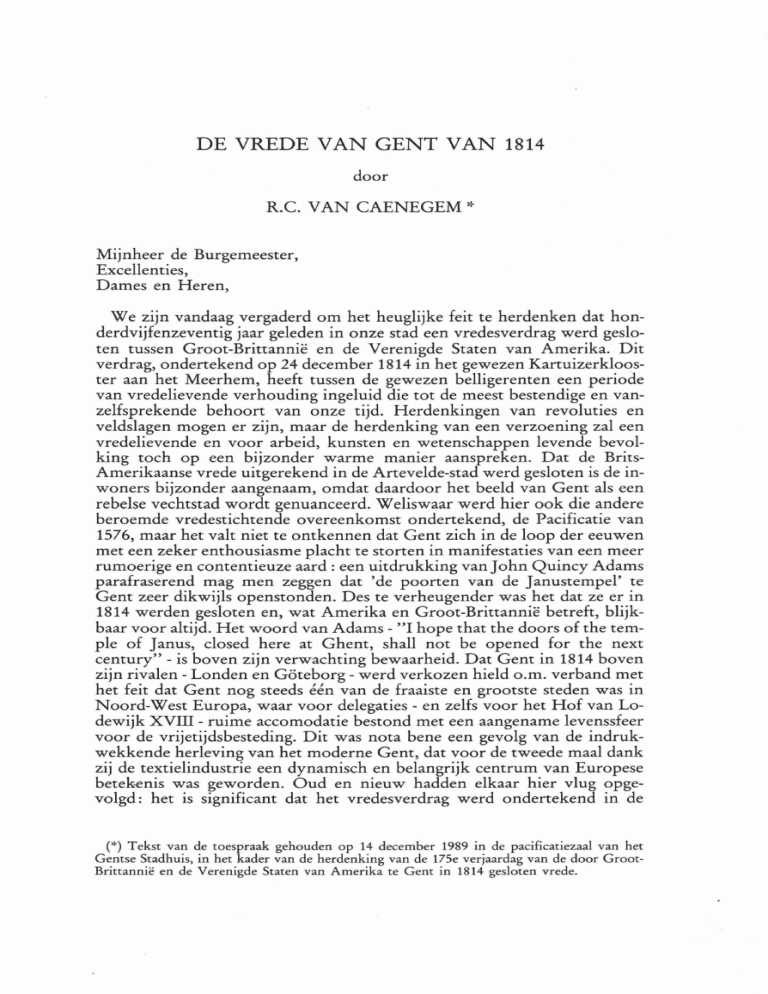
DE VREDE VAN GENT VAN 1814
door
R.C. VAN CAENEGEM
~•
Mijnheer de Burgemeester,
Excellenties,
Dames en Heren,
We zijn vandaag vergaderd om het heuglijke feit te herdenken dat honderdvijfenzeventig jaar geleden in onze stad een vredesverdrag werd gesloten tussen Groot-Brittannië en de Verenigde Staten van Amerika. Dit
verdrag, ondertekend op 24 december 1814 in het gewezen Kartuizerklooster aan het Meerhem, heeft tussen de gewezen heiligerenten een periode
van vredelievende verhouding ingeluid die tot de meest bestendige en vanzelfsprekende behoort van onze tijd. Herdenkingen van revoluties en
veldslagen mogen er zijn, maar de herdenking van een verzoening zal een
vredelievende en voor arbeid, kunsten en wetenschappen levende bevolking toch op een bijzonder warme manier aanspreken. Dat de BritsAmerikaanse vrede uitgerekend in de Artevelde-stad werd gesloten is de inwoners bijzonder aangenaam, omdat daardoor het beeld van Gent als een
rebelse vechtstad wordt genuanceerd. Weliswaar werd hier ook die andere
beroemde vredestichtende overeenkomst ondertekend, de Pacificatie van
1576, maar het valt niet te ontkennen dat Gent zich in de loop der eeuwen
met een zeker enthousiasme placht te storten in manifestaties van een meer
rumoerige en contentieuze aard: een uitdrukking van John Quincy Adams
parafraserend mag men zeggen dat 'de poorten van de Janustempel' te
Gent zeer dikwijls openstonden. Des te verheugender was het dat ze er in
1814 werden gesloten en, wat Amerika en Groot-Brittannië betreft, blijkbaar voor altijd. Het woord van Adams- "I hope that the doorsof the temple of Janus, closed here at Ghent, shall not be opened for the next
century"- is boven zijn verwachting bewaarheid. Dat Gent in 1814 boven
zijn rivalen - Londen en Göteborg - werd verkozen hield o.m. verband met
het feit dat Gent nog steeds één van de fraaiste en grootste steden was in
Noord-West Europa, waar voor delegaties- en zelfs voor het Hof van Lodewijk XVIII - ruime accomodatie bestond met een aangename levenssfeer
voor de vrijetijdsbesteding. Dit was nota bene een gevolg van de indrukwekkende herleving van het moderne Gent, dat voor de tweede maal dank
zij de textielindustrie een dynamisch en belangrijk centrum van Europese
betek-enis was geworden. Oud en nieuw hadden elkaar hier vlug opgevolgd: het is significant dat het vredesverdrag werd ondertekend in de
('~) Tekst van de toespraak gehouden op 14 december 1989 in de pacificatiezaal van het
Gentse Stadhuis, in het kader van de herdenking van de 175e verjaardag van de door GrootBrittannië en de Verenigde Staten van Amerika te Gent in 1814 gesloten vrede.
R.C. VAN CAENEGEM
8
(2)
salons van Lieven Bauwens' gewezen privé woonst, in hetzelfde gebouwencomplex van het oude Kartuizerklooster waar hij indertijd de eerste
mechanische katoenspinnerij van het vasteland had ingericht.
De Amerikaanse delegatie had meer politiek gewicht en ook meer bewegingsvrijheid dan de Britse. Ze bevatte o.m. de minister van financiën, Albert Gallatin, maar ook en vooral J ohn Quincy Adams, zoon van
President John Adams (president van 1797 tot 1801) en zelf toekomstig
president (1825-1829). De Amerikanen schijnen zich hier ook vlotter te
hebben ingeburgerd en hebben graag aan het Gentse society-leven deelgenomen : ze zijn bijv. erelid geworden van de Koninklijke Maatschappij
voor Landbouw en Plantkunde en van de Maatschappij voor Schone
Kunsten. De Britse delegatie was meer ondergeschikt aan haar regering en
ook afstandelijker. De bevolking schijnt de Amerikanen meer aan haar
boezem te hebben gedrukt en ook Hail Columbia (door J.Q. Adamsin een
brief aan zijn vrouw beschreven als een 'American national air') bijzonder
graag te hebben gehoord. Toen Mevrouw D'Hane niet aarzelde aan de
Britse onderhandelaar Goulburn te verklaren dat ze het 'Hail Columbia'
prefereerde boven het 'God save te King', antwoordde de flegmatieke Brit
'dat bewijst slechts, Mevrouw, dat u geen Engelse bent'. 1
Hoewel geografisch ver afgelegen, zijn de Verenigde Staten ons mentaal
steeds nabij geweest. Ze zijn in 1790 het model geweest voor onze
kortstondige 'Verenigde Nederlandse Staten'. Velen onzer landgenoten
hebben er in de 19e eeuw een nieuwe toekomst gevonden- onder wie de
chemicus Leo Hendrik Baekeland, die er zich in 1890 heeft gevestigd. En
wat wij aan de twee Angelsaksische grootmachten in onze eeuw verschuldigd zijn is eenieder wel bekend: men bedenke even onder welk regime
continentaal Europa thans zou leven indien de Angelsaksische mogendheden er niet waren geweest. Hun bondgenootschap is de stevigste pijler gebleken van de Vrije Wereld. Een bondgenootschap dat zo vanzelfsprekend
lijkt - en toch waren ze in het begin van de 19e eeuw met elkaar in oorlog.
Dit spektakel van de twee elkaar bevechtende Angelsaksische democratieën is merkwaardig. Niet alleen omdat het helemaal geen Angelsaksische
gewoonte is onderling op de vuist te gaan (en de oorlog van 1812-1814 was
dan ook relatief onbloedig en verliep op een erg onlogische en soms zelfs
grappige manier - in tegenstelling tot de oorlogen op het Europese continent), maar democratieën zijn door de band evenmin erg oorlogszuchtig.
Autocratieën geraken vlugger slaags en conflicten tussen een autocratie
en een democratie zijn ook frequenter. Toch hebben Griekse en Italiaanse
stadstaten elkaar in de Oudheid en de Middeleeuwen bevochten en er zijn
ook de drie 'Engelse oorlogen' van de 17e eeuw geweest, waarin Engeland
en de Verenigde Republiek elkaar hebben bekampt - twee mogendheden
die wel geen perfecte democratieën waren, maar toch veel democratischer
dan de absolutistische koninkrijken van hun tijd. De inzet was de beheersing van de zee, d.w.z. de toegang tot de wereldhandel.
(1) Brief van
J.Q.
Adams aan zijn vrouw Louisa dd. 24-1-1815.
(3)
DE VREDE VAN GENT VAN 1814
9
Op de dag van vandaag kent deze laatste een grote bloei : nooit zijn zovele en zo verscheidene goederen over een zo grote oppervlakte en tussen zovele volkeren verhandeld. Dit is o.m. mogelijk omdat de zeeën open en
veilig zijn : vrijbuiters en piraten horen thuis in het kinderuurtje en het
stripverhaal van het lichte genre. Eeuwenlang is het niet zo geweest en was
de wereldhandel een hachelijk avontuur. De pacificatie van de wereldzeeën
kon worden bereikt langs twee wegen, ofwel door vrij, vreedzaam overleg
tussen de zeevarende mogendheden, ofwel doordat één onder hen, in de
loop van talrijke conflicten, zichzelf als de politieman opwierp en zich
door de anderen deed aanvaarden.
Zoals bekend, werd deze tweede weg bewandeld en heeft Engeland de
Pax Britannica gevestigd waar het zelf, maar ook de andere naties van hebben geprofiteerd. In de Napoleontische tijd, waarin de Brits-Amerikaanse
oorlog is ontbrand, was juist de controle van de zeeën een inzet van de bittere Frans-Britse oorlog en het conflict van 1812-14 is daar eigenlijk een
spin-off, een nevenproduct van. Want het is om zeevaart en zeehandel dat
het allemaal begonnen is : ik herinner u, zonder in details te treden, aan
de fameuse Britse Orders in Council tegen de Amerikaanse scheepvaart en
de onderschepping door Britse zeebodems van Amerikaanse vaartuigen,
die ervan verdacht werden Britse deserteurs te vervoeren.
Ladies and gentlemen,
That the two great Anglo-Saxon powers were at the beginning of the nineteenth century engaged in a shooting war may be considered an oddity
in itself, but various aspects of the origin, the progress and the condusion
of that armed conflict are so incongruous as to lend it an altogether unreal
air. It looks indeed as if some Mad Hatter had been at work!
The phoney war of 1812-14 was unwillingly blundered into by the two
countries concerned. No one in Britain wanted another War of Independenee - one Yorktown was enough - a·nd certainly not while the country
was fighting Napoleon to the death. And certainly not everybody in America wantedit : if some interested parties were for, others were outspokenly against. Nor is it dear why exactly the war was started. It had something
to do with navigation and trade, but a shooting war on the Atlantic was
not going to stimulate American commerce. It had something to do, we
are told, with Canada and the fate of the Red Indians and fishing rights.
None of it sounds convincing. The only precise bone of contention were
the famous 'Orders in Council', which hurt American pride, but the irony
of the case is that Castlereagh had announced the suspension of those Orders against American shipping, i.e. against neutral traders, on 16 June
1812 : two days before they allegedly led to the American dedaration of
war on 18 June. However, the news of their suspension took several weeks
to reach the other side of the Atlantic. The same confusion surrounded the
condusion of the treaty thirty months later. None of the original bones
of contention was mentioned with any precision, let alone solved - considering their hazy nature that would have been difficult. The delegates
10
R.C. VAN CAENEGEM
(4)
agreed expressly on one point only - that the war was over (they were understandably keen on this as it was Christmas Eve), and the rest was left
to commissions to elucidate and negotiate. In the treaty itself nothing was
said about all this, and the observer may well wonder why so serious a city
as Ghent was chosen for so frivolous an occasion. In the meantime the progressof the war had not been without its odd, and even comic incidents.
In the summer of 1814 the British commander, General Robert Ross, pressed on with his attack on Washington, the brand-new American capita!,
and did this so quickly and cleverly that the enemy was completely taken
by surprise. So much so that when his officers, on the evening of 24 August, reached Washington, they arrived just in time at the White House
to eat the dinner that had been prepared for the President and Mrs. Madison. The war mercifully cost relatively few lives - 1877 American soldiers
and sailors were killed in action in two and a half years of warfare on land
and sea. This can to some extent be explained by a certain casualness and
lack of enthusiasm for killing the 'enemy', as illustrated in the enterprise
of Major General Henry Dearborn whowas supposed, in the autumn of
1812, to strike a fatal blow against the Canadians at Montreal. After, on
19 November, he had marched his troops twenty miles north of Plansburg, the militia refused to go further, and Dearborn marched them back
to Plattsburg. He seems to have taken a leaf out of the book of the grand
old duke of York, who "had 10.000 men, he marched them up to the top
of the hill, and he marched them down again". The final irony came with
the one great engagement which ended in an American victory, the battle
of New Orleans, which wiped out all previous American defeats and ended
the war in a blaze of glory.
The only snag was that the victory was won a fortnight after the .war
was ended, i.e. on 8 January 1815. But again, the good news from
Ghent had not reached New Orleans in time. It has been said of Cbristopher Columbus that when he left, he did not know where he was going,
and when he came back, he did not know where he had been. Similarly
it could be said of the Anglo-American war that it was declared after the
cause of the war had vanished, and that its main battle was fought after
the peace had been signed. If only Marconi had lived a few generations
earlier !
All these oddities, ladies and gentlemen, should notobscure the underlying
seriousness of the conflict. The war that ended here 175 years ago was not
meaningless. The real issue was neither deserters nor Red Indians, but a
motif of politica! psychology.
The pride of a new, ex-colonial nation was at stake. There was a clash
of generations, a mother-and-daughter conflict. "We are going to fight,
said Andrew Jackson in 1812, forthereestablishment of our national character, misunderstood and vilified at home and abroad". America had been
a naughty daughter, annoying a mother who was in serious trouble, at a
most inconvenient moment. But the parent was not blameless, for she treated her offspring with insufficient respect and consideration, she had not
understood that American "submission to the Orders in Council would
(5)
DE VREDE VAN GENT VAN 1814
11
have meant acceptance of colonial status and loss of national ho nor" 2 •
Whether we consider the conflict of 1812-14 asthelast phase of America's
War of Independence, or as her Second War of Independence, what was
established in Ghent once and for all was that America had come of age.
There was no need for mother Britannia to teach her daughter lessons, for
mother's apron strings had finally been cut. Indeed, "the United States had
dared a second time to wage war with the mightiest power on earth, and
it had come out whole" 3 • There was, however, no doubt that mother remained a formidable old lady, so that dreams of robhing her of Canada and
such like ambitions were patently unrealistic. After all, it may safely be
said that 1814 saw the start of a century of world wide Pax Britannica.
The American War of Independenee was not only an act by which thirteen colonies liberated themselves from the dictates of a far-away mother
country. It also was a revolution, which led not only to the independenee
of the country- which is an external element- but providedit with a different constitution and new politi cal and social structures. The U nited States
were a new type of state on the stage of western history - a state without
a monarchy, without a nobility, without an Established Church, with a
federal structure and an elected president. The novelty of this experiment
of the years 1776- the Declaration of Independenee- 1787- the Constitution - and 1791 - the Bill of Rights - was truly staggering and guarantees it
a place in the series of the great events described in Brinton's Anatomy of
Revolution, which led the way to the modern world 4 • They were the Puritan revolution of seventeenth-century England, the American and the
French revolutions of the late eighteenth and the Russian revolutions of
Marchand November 1917, known as the February and October revolutions. Brinton's analysis- or 'anatomy' as he called it- was certainly correct,
but it was incomplete. Indeed, ladies and gentlemen, I cannot help pointing
out, in the very building where the Pacification of Ghent was signed, that
the great anti-absolutist revolts described by Erinton were preceded by
that of the Low Countries against the rule of King Philip II, wich should
have been included in his study. There is no doubt that the chain of revolt
which ultimately broke the back of tyrannical rule started with the dramatic events of the sixteenth century. The northern part of the Low Countries, which escaped Spanish reconquest, founded the Dutch Republic,
whose culture influenced Cromwell's Puritan calvinists and whose federal
structure was an inspiration for the Founding Fathers of the United States
of America.
We have already mentioned the differences between the British parent
and the American offspring: they are glaring. Nevertheless, daughters never get completely away from mother: their ancestry will show, no matter
how hard they try. It was not different with the young American Republic, whose resemblance and links with the old country-where some 90%
(2) S.E. Morison, H.S. Commager, W.E. Leuchtenburg, The Growth of the American Repu·
blic, I, Oxford University Press, 21980, p. 360.
(3) Morison et al., op. cit., I, p. 386.
(4) C. Brinton, The Anatomy of Revolution, New York, 2 1965.
12
R.C. VAN CAENEGEM
(6)
of the eighteenth-century Americans came from - are not difficult to discover : the ties of language, the tradition of free enterprise, the common law
(in spite of some vague ambitions to switchtosome codified system in the
continental European vein) and the limitation of governmental power by
constitutional guarantees. America not only conserved and cherished this
chain of sacred English texts - from Magna Carta over the Petition of Right
to the Bill of Rights -, she completed and perfeered that line of thought
in a more radical way than the mother country ever did, by adopting a
written constitution and subjeering the legislature to the judicia! control
of the constitutionality of the laws.
lt was the Treaty of Ghent that launched the United States finally on
its own course among the comitas nationurn - and what a course it has
been!

